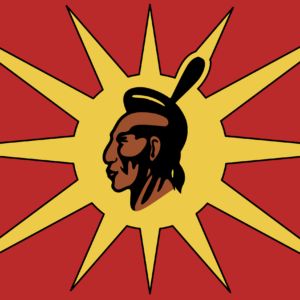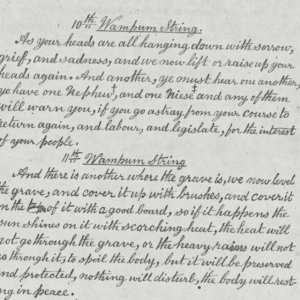
If you want to start a nice fight on Six Nations you can ask people when the Peacemaker brought unity to the Haudenosaunee people. Our scientist friends have told us 1451 AD is the most likely date as it coincides with a solar eclipse but everyone has a different story.
The oral tradition says the sun went dark during the Peacemaker’s mission and scholars such as William N. Fenton have applied dates to the GAYANESHAKGOWA – some as early as 1142 AD. Of course the scholars didn’t bother asking the Haudenosaunee people themselves, who claim this constitution is most ancient and cannot be dated.
No matter the date one thing is for certain. This constitution brought peace and stability to the Five Nations and the League that was established endured throughout the centuries until today. This constitution symbolized by the Hiawatha wampum may have been the glue that kept everyone together but it was also the power of the people.
The uneducated who are not familiar with GAYANESHAKGOWA, the Great Peace may think it is simply “Indian Religion” or a collection of archaic folk tales. But what the Peacemaker has left for us is a step by step instruction manual on how to politically organize, make decisions, and preserve unity without disrespecting the autonomy of each person, clan, and nation. It’s all there and it is surprisingly relevant today.
There are many different translations and interpretations of the Great Peace (also known as the Great Law). Some elders say it shouldn’t be written down and that it is meant to be shared from the heart in that old way. In 1916 a compilation was made from six different translations and it emphasized the role of the common people. Here are some excerpts:
The referendum. The people decide on the most important matters
Whenever an especially important matter or a great emergency is presented before League Council and the nature of the matter effects the entire body of Five Nations threatening their utter ruin, then the chiefs of the League must submit the matter to the decision of their people and the decision of the people shall effect the decision of the League Council. This decision shall be a confirmation of the voice of the people.
The men of every Clan shall hold a council and their decision shall be considered by the Council of Chiefs.
The men of every Clan of the Five Nations shall have a Council Fire ever burning in readiness for a Council of the Clan. When it seems necessary for the interest of the people, for a council to be held to discuss the welfare of the Clan, then the men may gather about the fire. This council shall have the same rights as the Council of Women.
The Council Fires of the women of every Clan have the same rights as the councils of the men
The women of every Clan of the Five Nations shall have a Council Fire ever burning in readiness for a council of the Clan. When in their opinion it seems necessary for the interest of the people, they shall hold a council and their decision and recommendation shall be introduced before the Council of Chiefs by the War Chief for its consideration.






